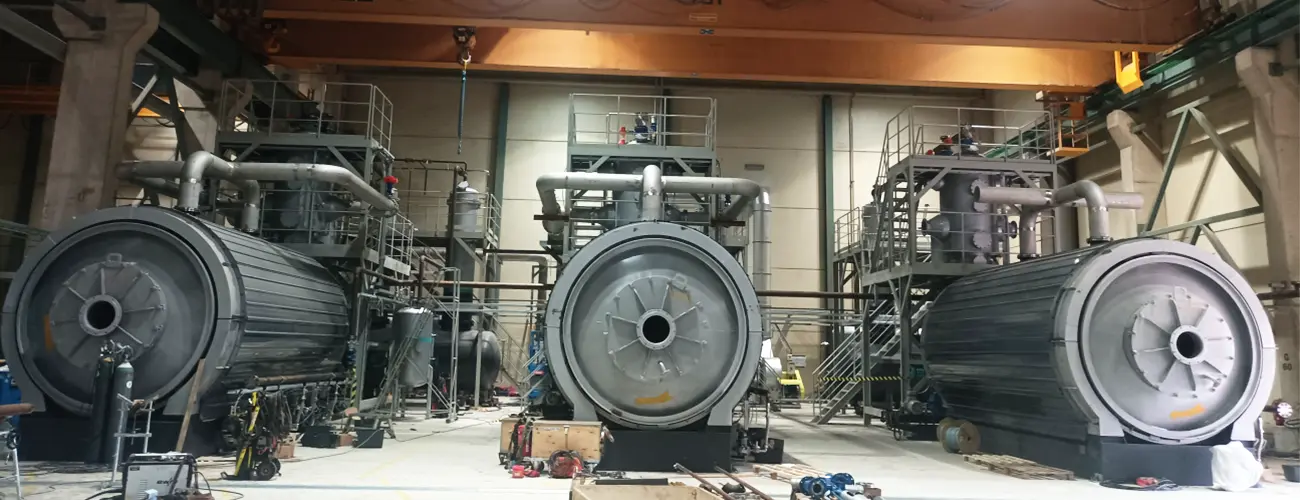Plastic waste represents one of the most pressing environmental challenges of the modern age. However, recent advancements in waste-to-energy technologies, particularly pyrolysis plants, have opened new possibilities for converting plastic waste into valuable resources. Pyrolysis oil, one of the primary by-products of the plastic pyrolysis process, has proven to be a versatile and valuable product. This oil, derived from the thermal decomposition of plastics in an oxygen-free environment, can be utilized across various industries, contributing to both economic and environmental sustainability.
Industrial Fuel and Energy Source
One of the most significant uses of pyrolysis oil is as an alternative industrial fuel. The oil contains a mixture of hydrocarbons that can be refined and processed into a high-energy liquid fuel suitable for various combustion applications.
-
Power Generation: Pyrolysis oil can be used in industrial boilers or furnaces to generate heat or steam. This application is particularly valuable in industries that rely on large-scale energy production, such as cement, steel, and paper manufacturing. Pyrolysis oil offers a renewable alternative to fossil fuels, reducing the carbon footprint of energy-intensive processes.
-
Internal Fuel for Pyrolysis Plants: A significant advantage of pyrolysis oil is its ability to be reused within the same plastic to oil machine. The non-condensable gases produced during pyrolysis can be fed back into the system to sustain the reactor’s temperature. This closed-loop energy system helps reduce the operational costs associated with external fuel sources, further enhancing the economic feasibility of plastic waste conversion.

Refining into Valuable Chemical Products
Another key application of pyrolysis oil lies in its potential for refining into a range of valuable chemical products. The oil contains a wide array of hydrocarbons, some of which are essential feedstocks for the chemical industry.
-
Diesel and Gasoline Substitutes: With proper distillation, pyrolysis oil can be refined to produce high-quality diesel or gasoline-like fuels. These refined products can be used in transportation or machinery, offering a more sustainable alternative to petroleum-based fuels. The process also contributes to reducing reliance on crude oil and supporting the transition to more sustainable energy sources.
-
Chemical Feedstocks: Pyrolysis oil contains various organic compounds that can be extracted and used as raw materials in the production of chemicals, solvents, and adhesives. For example, phenols, aliphatic compounds, and other by-products of the oil can be utilized in the manufacture of paints, coatings, and plastics. The ability to reuse these compounds from waste plastics not only reduces the need for virgin materials but also contributes to circular economy practices.
Environmental Remediation and Soil Amendment
Beyond its role as a fuel or chemical feedstock, pyrolysis oil also finds application in environmental management. The oil’s high carbon content, along with its capacity to retain many of the original properties of the plastic it was derived from, makes it a useful tool in certain environmental applications.
-
Soil Amendment: When combined with biochar, a solid by-product of the pyrolysis process, pyrolysis oil can be used as a soil enhancer. This combination improves soil health by increasing its nutrient retention, promoting microbial activity, and enhancing water retention properties. In regions with poor or degraded soils, this application offers a sustainable way to restore agricultural productivity.
-
Wastewater Treatment: Some studies suggest that pyrolysis oil, especially when processed into its charred form, can be used in wastewater treatment plants. The high surface area of the char allows it to adsorb organic contaminants, heavy metals, and other pollutants from water. This not only helps in reducing the environmental impact of waste materials but also adds another layer of economic value to the pyrolysis process.
Transportation and Petrochemical Industries
Pyrolysis oil has a significant role in the transportation and petrochemical sectors. The demand for sustainable, renewable alternatives to traditional fuels has driven interest in utilizing waste-derived oils like those produced from plastic pyrolysis.
-
Biofuel Production: Pyrolysis oil can serve as a precursor for biodiesel production. After undergoing a process of transesterification, the oil can be converted into biodiesel, which is used in diesel engines. This biofuel can be utilized in both transportation and stationary power generation applications, offering a greener alternative to fossil-derived diesel.
-
Petrochemical Industry Feedstock: The chemical composition of pyrolysis oil also makes it a potential feedstock for the petrochemical industry. By further refining pyrolysis oil, certain hydrocarbons can be extracted and used in the production of polymers, resins, and other materials traditionally derived from petroleum. This not only reduces the need for virgin petrochemicals but also supports the recycling of plastic waste into new plastic products.
Economic and Environmental Impacts
The diverse applications of pyrolysis oil highlight its significant role in both economic growth and environmental conservation. By diverting plastic waste from landfills and incinerators, pyrolysis plants provide an effective waste-to-energy solution that contributes to the reduction of plastic pollution.
-
Waste Reduction: Pyrolysis oil production offers an environmentally friendly alternative to plastic waste incineration, which produces harmful emissions. The pyrolysis process minimizes greenhouse gas emissions and toxic by-products, making it a more sustainable waste management option.
-
Job Creation: The growing demand for pyrolysis technologies in various industries, including waste management, energy production, and chemical manufacturing, has led to the creation of new job opportunities. From plant construction and operation to research and development, the industry offers a wide array of employment prospects.
The versatility of pyrolysis oil from plastic waste is evident across multiple industries, ranging from energy production to environmental remediation. Through continued advancements in pyrolysis plant technology, this oil can be harnessed for a wide array of applications that reduce reliance on traditional fossil fuels and support the transition to a circular economy. By transforming plastic waste into valuable resources, pyrolysis oil offers both economic and environmental benefits that contribute to sustainable development.
Comments
No comments yet. Be the first to react!